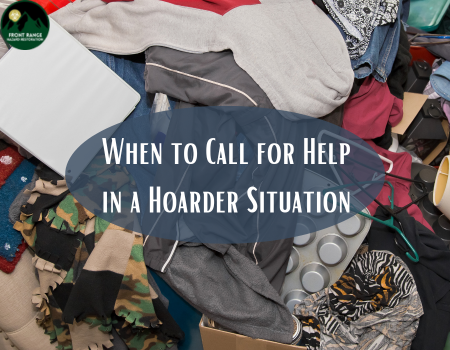Hoarder situations can be challenging to navigate, both for the individual affected and their loved ones. Hoarding disorder is a complex mental health condition characterized by excessive accumulation of belongings, difficulty discarding items, and significant distress or impairment as a result. Knowing when to call for help in a hoarder situation is crucial for addressing the underlying issues and providing support to those in need.
Recognizing the Signs of a Hoarder Situation
 Excessive Clutter:
Excessive Clutter:
- One of the most noticeable signs of hoarding disorder is the presence of excessive clutter in the individual’s living spaces. Hoarders may have difficulty organizing or categorizing their belongings, leading to clutter that obstructs walkways and living areas.
- Difficulty Discarding Items:
- Hoarders often have difficulty discarding items, regardless of their value or usefulness. They may experience intense anxiety or distress at the thought of parting with possessions and may exhibit compulsive hoarding behaviors, such as excessive acquisition of items or reluctance to throw anything away.
- Social Isolation:
- Hoarding disorder can lead to social isolation and withdrawal from friends, family, and community activities. Hoarders may feel embarrassed or ashamed of their living conditions and may avoid inviting others into their homes.
- Impact on Functioning:
- – Hoarding can have a significant impact on the individual’s daily functioning and quality of life. It may interfere with activities of daily living, such as cooking, cleaning, and personal hygiene, and can pose safety hazards, such as fire or tripping hazards.
- Health and Sanitation Concerns:
- Hoarding can create unsanitary living conditions that pose health risks to the individual and others in the household. Accumulated clutter can harbor mold, bacteria, pests, and other allergens, increasing the risk of respiratory problems and other health issues.
Knowing When to Seek Help for a Hoarder Situation
- Concern for Safety:
- If you have concerns about the safety and well-being of the individual or others in the household due to hoarding-related hazards, it may be time to seek help. Safety concerns may include fire hazards, structural damage, or unsanitary living conditions.
- Decline in Mental Health:
- Hoarding disorder often coexists with other mental health conditions, such as depression, anxiety, or obsessive-compulsive disorder (OCD). If you notice a decline in the individual’s mental health or functioning, it may indicate the need for professional intervention.
- Inability to Manage Clutter:
- If the individual is unable to manage or control their hoarding behaviors on their own, despite efforts to declutter or organize their living spaces, professional help may be necessary. Hoarding disorder typically requires specialized treatment and support from mental health professionals.
- Family Intervention:
- Family members or loved ones may intervene if they are concerned about the hoarding behaviors of a relative or friend. An intervention can involve expressing concern for the individual’s well-being, offering support and encouragement, and facilitating access to professional help to help the hoarder situation.
Seeking Professional Help for a Hoarder Situation
- Therapy and Counseling:
- Cognitive-behavioral therapy (CBT) and other evidence-based therapies are effective treatments for hoarding disorder. Therapists can help individuals understand and challenge their hoarding-related beliefs and behaviors and develop skills to manage their symptoms.
- Support Groups:
- Support groups, such as clutterers anonymous or hoarding support groups, provide a safe and supportive environment for individuals with hoarding disorder to share their experiences, receive encouragement, and learn from the experiences of others.
- Professional Organizers and Cleanout Services:
- Professional organizers and cleanout services specialize in helping individuals declutter and organize their living spaces in a respectful and non-judgmental manner. These services can provide practical assistance with sorting, packing, and disposing of items, as well as developing strategies for maintaining clutter-free environments.
- Community Resources:
- Community agencies and social services may offer resources and support for individuals with hoarding disorder and their families. This may include case management, housing assistance, and access to mental health services.
Conclusion
Recognizing when to seek help in a hoarder situation is essential for addressing the underlying issues and providing support to those in need. If you or someone you know is struggling with hoarding disorder, it’s important to reach out for professional help and support. With the right interventions and treatment, individuals with hoarding disorder can learn to manage their symptoms, improve their quality of life, and regain control over their living spaces.

